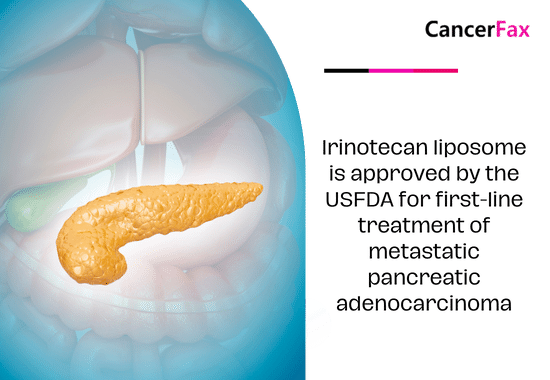Irinotecan liposome is approved by the USFDA for first-line treatment of metastatic pancreatic adenocarcinoma
The Food and Drug Administration approved irinotecan liposome (Onivyde, Ipsen Biopharmaceuticals, Inc.) with oxaliplatin, fluorouracil, and leucovorin on February 13, 2024, for treating metastatic pancreatic adenocarcinoma as the initial therapy.
NAPOLI 3 (NCT04083235) was a randomized, multicenter, open-label, active-controlled trial with 770 people who had pancreatic adenocarcinoma that had spread to other parts of the body and had never been through chemotherapy in this stage before. It looked at how well the treatment worked. Randomization was categorized based on area, liver metastases, and ECOG performance status. Patients were randomly assigned, in a 1:1 ratio to receive one of the specified therapies.
NALIRIFOX regimen consists of irinotecan liposome at a dosage of 50 mg/m2 administered intravenously over 90 minutes, followed by oxaliplatin at a dosage of 60 mg/m2 administered intravenously over 120 minutes, followed by leucovorin at a dosage of 400 mg/m2 administered intravenously over 30 minutes, followed by fluorouracil at a dosage of 2400 mg/m2 administered intravenously over 46 hours, with this cycle repeated every 2 weeks.
Administer Nab-paclitaxel at a dose of 125 mg/m2 intravenously over 35 minutes, followed by gemcitabine at a dose of 1000 mg/m2 intravenously over 30 minutes on days 1, 8, and 15 of a 28-day cycle.
The primary efficacy measure was overall survival (OS). Other effectiveness criteria were investigator-assessed progression-free survival (PFS) and objective response rate (ORR). NAPOLI 3 showed a substantial increase in overall survival (OS) and progression-free survival (PFS) for the NALIRIFOX group compared to the Gem+NabP group. The median overall survival was 11.1 months (95% CI: 10.0, 12.1) in the NALIRIFOX group and 9.2 months (95% CI: 8.3, 10.6) in the Gem+NabP group. The Hazard Ratio (HR) was 0.84 (95% CI: 0.71, 0.99) with a p-value of 0.0403. The median progression-free survival was 7.4 months (95% CI: 6.0, 7.7) in the NALIRIFOX group and 5.6 months (95% CI: 5.3, 5.8) in the Gem+NabP group (HR 0.70 [95% CI: 0.59, 0.85]; p-value 0.0001). The objective response rate (ORR) was 41.8% (95% CI: 36.8, 46.9) in the NALIRIFOX group and 36.2% (95% CI: 31.4, 41.2) in the Gem+NabP group.
The primary side effects of NALIRIFOX, with a notable difference compared to Gem+NabP, were diarrhea, exhaustion, nausea, vomiting, decreased appetite, gastrointestinal pain, mucosal inflammation, constipation, and decreased weight. The prevalent laboratory abnormalities (≥10% Grade 3 or 4) included reduced neutrophils, potassium, lymphocyte, and hemoglobin levels.
The suggested dosage of irinotecan liposome is 50 mg/m2 given through intravenous infusion lasting 90 minutes every 2 weeks. Administer irinotecan liposome prior to oxaliplatin, fluorouracil, and leucovorin. No specific dosage of irinotecan liposome is advised for patients with blood bilirubin levels beyond the upper limit of normal.
Dr. Nishant Mittal is a highly accomplished researcher with over 13 years of experience in the fields of cardiovascular biology and cancer research. His career is marked by significant contributions to stem cell biology, developmental biology, and innovative research techniques.
Research Highlights
Dr. Mittal's research has focused on several key areas:
1) Cardiovascular Development and Regeneration: He studied coronary vessel development and regeneration using zebrafish models1.
2) Cancer Biology: At Dartmouth College, he developed zebrafish models for studying tumor heterogeneity and clonal evolution in pancreatic cancer.
3) Developmental Biology: His doctoral work at Keio University involved identifying and characterizing medaka fish mutants with cardiovascular defects.
4) Stem Cell Research: He investigated the effects of folic acid on mouse embryonic stem cells and worked on cryopreservation techniques for hematopoietic stem cells.
Publications and Presentations
Dr. Mittal has authored several peer-reviewed publications in reputable journals such as Scientific Reports, Cardiovascular Research, and Disease Models & Mechanisms1. He has also presented his research at numerous international conferences, including the Stanford-Weill Cornell Cardiovascular Research Symposium and the Weinstein Cardiovascular Development Conference.
In summary, Dr. Nishant Mittal is a dedicated and accomplished researcher with a strong track record in cardiovascular and cancer biology, demonstrating expertise in various model systems and a commitment to advancing scientific knowledge through innovative research approaches.
- Comments Closed
- March 5th, 2024






FDA-approved pancreatic drugs 2024, First-line mPAC treatment, Irinotecan liposome approval, Liposomal chemotherapy, Metastatic adenocarcinoma therapy, NALIRIFOX regimen, Onivyde for pancreatic cancer, Pancreatic cancer breakthrough
CancerFax is the most trusted online platform dedicated to connecting individuals facing advanced-stage cancer with groundbreaking cell therapies.
Send your medical reports and get a free analysis.
🌟 Join us in the fight against cancer! 🌟
Привет,
CancerFax — это самая надежная онлайн-платформа, призванная предоставить людям, столкнувшимся с раком на поздних стадиях, доступ к революционным клеточным методам лечения.
Отправьте свои медицинские заключения и получите бесплатный анализ.
🌟 Присоединяйтесь к нам в борьбе с раком! 🌟